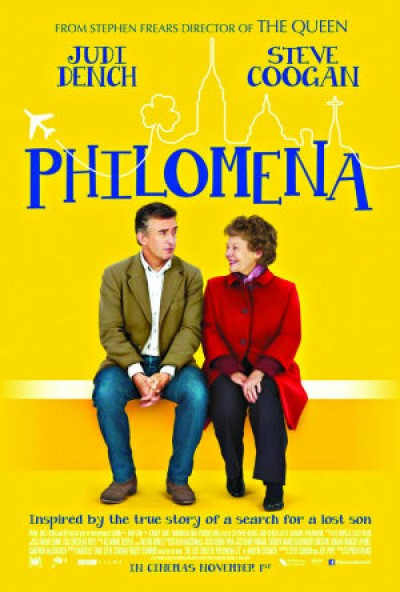“No one’s interested in Russian bloody history”
The dreaded ‘human interest story’—a tale about naively ignorant folk read by naively ignorant folk. I paraphrase what wrongly disgraced journalistMartin Sixsmith (Steve Coogan) dryly quips when first told about the aging woman’s plight he would soon use to rejuvenate his career (at least where the film’s concerned considering he published The Lost Child of Philomena Leeeight years after his being ‘resigned’ from the BBC), but you get the point. Why would anyone who covered political scandals and wars want to run around with senior citizens as they try to find long lost children? Martin definitely didn’t, but the prospect of a published article was too good to pass up at this career low-point. The dark, conspiratorial places the titularPhilomena (Judi Dench) takes him were just a journalistic perk he didn’t expect.
Adapted by Coogan and Jeff Pope, this look into an Irish Catholic Church’s superiority complex on morality finds itself becoming a rather stunning commentary on faith and religion both as a business of ill-repute and an establishment instilling love and forgiveness into its flock of lost creatures desperate for meaning. Putting an atheist like Sixsmith in a car with a devout Christian like Philomena will do that, always juxtaposing their two ideals whether it be about the church or simply the social standing in which they exist. There is a personality clash wherein his cynicism and entitlement can’t help but interpret her easy compassion and empathy as naivety when she honestly just wants to live a life without hate in her heart—something he’s found a lot of inside his since his controversial fall from media’s graces.
It begins on the fiftieth birthday of the young boy Philomena lost decades ago at a convent in Roscrea. Impregnated out of wedlock at a fair, her parents gave her to the nunnery so they could tell the family she died instead of admitting the disgrace she bestowed upon them. Made to work for four years after signing away her guardianship thanks to the guilt of sin, her hour a day spent with son Anthony evaporated once a couple came and took him away without a goodbye. Only after many years, a marriage, and a daughter (Anna Maxwell Martin’s Jane) did the sin of lying about her past overwhelm the one that created it. The fact Jane happened to be working a party Martin attended the same night her mother confessed was simply a fateful coincidence.
Martin and Philomena’s journey together takes them to the convent, America, and back again before every detail is uncovered. Coogan and Pope inject a healthy portion of comedy to the proceedings with help from Dench’s infectious enthusiasm and simple pleasures. Whether she’s calling Martin in the middle of the night to let him know she has a spare bathrobe in her hotel room or she’s summarizing an entire paperback romance she read under the guise of whetting his clearly uninterested appetite to borrow it, she is the epitome of motherly charm and love despite her rather tragic circumstances. She finds the drama as well—especially when Coogan’s Martin cannot control his sarcastic, elitist personality—empowering us with her underestimated strength and breaking our hearts with her wealth of emotion.
Director Stephen Frears handles the material with an expert eye, cutting in flashbacks to the convent with young Philomena (Sophie Kennedy Clark) as well as aged home movies of Anthony’s arrival to America and the childhood she missed. It’s a very calculated dissemination of information that appeals to our emotions before our minds, instilling this sense of loss and hope for reunion before the truth of where he landed and why they had yet to meet are discovered. Whether he was alive or dead, Philomena soon understands that her one dream was to know he had at least wondered about his Irish childhood and perhaps her in the process. And while what she finds out is a travesty at the hands of the Catholic nuns, it’s also a confirmation that their love for one another never ceased despite time or distance.
The film can be a bit heavy-handed with a somewhat obtrusive score pulling at heartstrings as well as an almost too forceful attempt at showcasing Sixsmith’s crisis of integrity where it comes to getting his story above helping his poor subject. But while such things may have made me roll my eyes at times, it caused the audience I saw it with to erupt in applause more than once as their investment in the quest went all-in. And as each person in Anthony’s life is uncovered—whether he (Sean Mahon), sister Mary (Mare Winningham), or boyfriend Pete (Peter Hermann)—the crowd could visibly be seen counting the seconds until everything could make sense for them to be together. It may not turn out as she or we would have wanted, but there is a gracefully bittersweet closure nonetheless.
So while it’s for all intents and purposes a human-interest story with a few aspects of Catholic tyranny and guilt standing in the way of a mother and son being together, it’s the sort of true-life account that goes beyond preconceptions of what such things entail. Bolstered by Coogan’s fearless tenacity and capacity for growth alongside Dench’s portrait of a courageous woman with an ability to look beyond herself to understand forgiveness is the hardest thing any of us can give, Philomena is able to touch even the most cynical of us with its message. As much a diatribe against the church as an example of faith’s unparalleled power, it refuses to fall prey to what easily could have devolved into a vicious exposé about Catholicism’s evil by showing how love truly does conquer all. Even in tragedy.
Score: 8/10
Rating: PG-13 | Runtime: 98 minutes | Release Date: November 1st, 2013 (UK)
Studio: The Weinstein Company
Director(s): Stephen Frears
Writer(s): Steve Coogan & Jeff Pope / Martin Sixsmith (novel The Lost Child of Philomena Lee)

